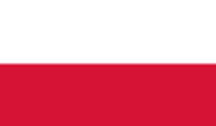- The official name of Poland is "Rzeczpospolita Polska". In English it is the Republic of Poland.
- History. Many different tribes lived in the area that is now Poland, including the Celts, Balts, Scythians, Huns, Goths, and Germanic peoples. It is believed that several different Slavic tribes settled the area in the 6th or 7th century. By the mid-10th century, the Polania tribe became dominant. Legends say that the chief, Piast, united the groups into one nation, naming it Polska. This region became Wielkopolska, or Greater Poland. In 966 CE Duke Mieszko I became Poland's first recorded leader, and thus began the birth of the Polish nation.
- Geography. Poland is a country in Central Europe, bordered by Germany to the west; the Czech Republic and Slovakia to the south; Ukraine, Belarus to the east; and the Baltic Sea and Kaliningrad Oblast (a Russian exclave) and Lithuania to the north.
- World War II. On September 1, 1939, Nazi Germany invaded Poland and this was one of the main things that started World War II
- Poland's name. "Polska", may be derived from the word "Polanie" or "people of the fields," the name of tribe that used to inhabit the area around Grodno and Poznań where the Polish state first arose.
- Tolerance. Poland has been seen by many as a "pioneer of tolerance". This may stem from the fact that there is not a history in this country of wars provoked by Religion.
- Language. The Polish language is a Western Slavonic language. The deaf communities in Poland use Polish Sign Language. In the country 97.9% of the people speak Polish. Other languages include: German 0.4%, Belarussian 0.1%, Ukrainian 0.1%, Lithuanian, Russian, and Kashubian. There are also many local dialects and slangs (e.g. highlander, Silesian, Pomeranian, etc.).
- Polish cuisine is rich in meat (especially sausage, pork, chicken, and beef), sauerkraut, cucumbers, sour cream, mushrooms, winter vegetables, spices, soups and pasta. Meals are hearty and the preparation of traditional dishes can be time-intensive. Holiday meals can take several days to prepare. in their entirety. Different regions of the country have their own traditions and flavors.
- Krakow is one of the most culturally and politically significant cities in Poland. Both the Historic City Centre and the Jewish District are brimming with cafés, shops, and pubs, and there is a 10-acre Main Market Square.
- Warsaw is the capital of Poland. It is very green and the Vistula, Europe's "wildest" river, flows through the center of the city. Warsaw boasts the tallest four-faced clock tower in the world.
- Government. Poland is a Parliamentary republic. It has a President and a Prime Minister.
- Football (soccer) is Poland's most popular sport. In the early 1980s the Polish national football team achieved their best results in any FIFA World Cup competitions finishing 3rd place in 1974 and 1982. The team won a gold medal at the 1972 Summer Olympics and two silvers in 1976 and 1992. Poland, along with Ukraine, hosted the UEFA European Football Championship in 2012.
FRUA is a service-marked acronym of Families for Russian and Ukrainian Adoption in use since 1994. It and the full organizational name,
Families for Russian and Ukrainian Adoption, are not to be used to describe any organization or service not related to FRUA, without permission.
Families for Russian and Ukrainian Adoption, are not to be used to describe any organization or service not related to FRUA, without permission.
© 2023 Families for Russian and Ukrainian Adoption Including Neighboring Countries






